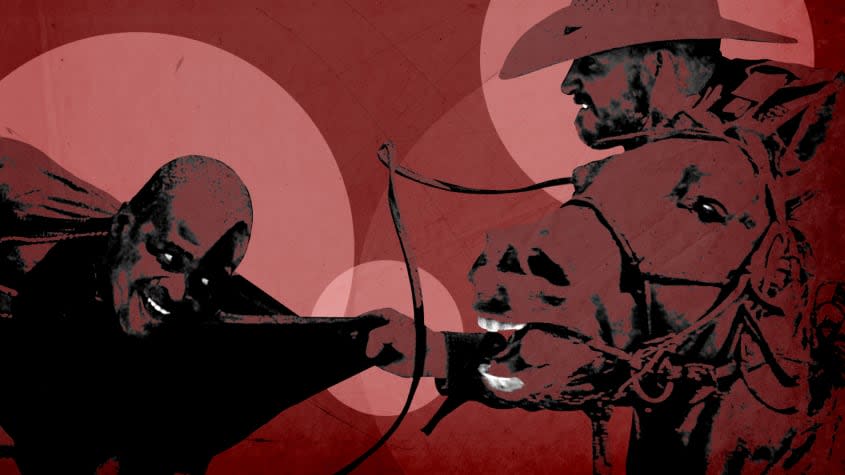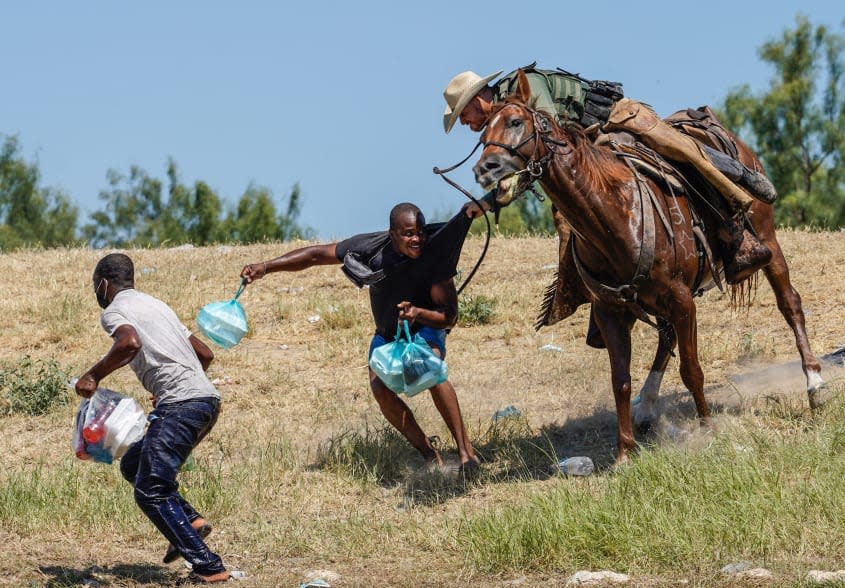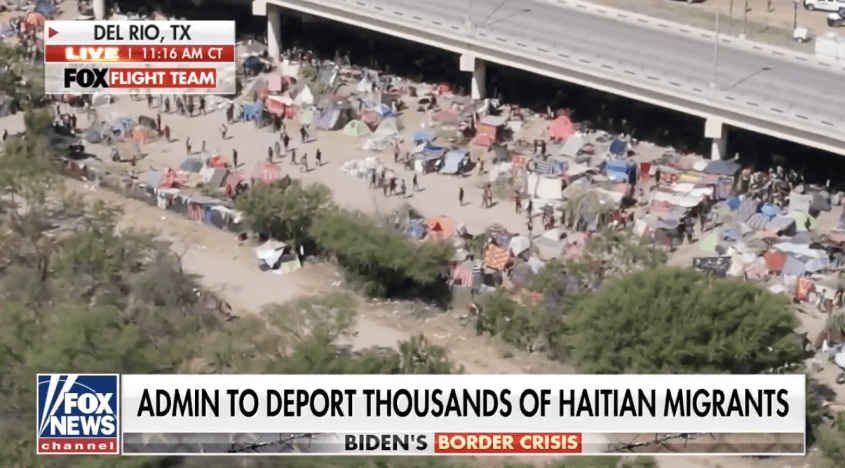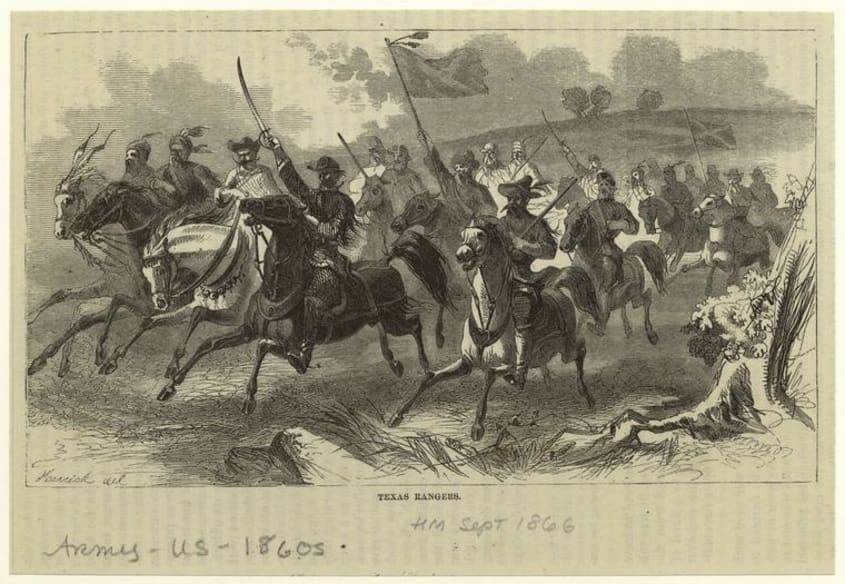The viral photo of Haitian migrants taps into the dark echoes of American history

We don't know the names of the men in the picture, or the story that brought them to the banks of the Rio Grande — only that they are clearly panicked. One is turned away from the camera, his body frozen in a zig-zagged crouch, gripping tightly to a clear plastic bag of styrofoam food containers and a sweet red drink. The other man is centered, and it's his expression that confirms him as the image's focal point: his mouth partially open, whites of his eyes showing in a universal expression of fear, the blue plastic bags of food swinging heavy and precious from his hands. The curl of what looks to be a whip seems to lick the part of his back where it bends away from the rider towering above him on horseback. The rider holds the man captive by his jacket, and a cowboy hat shades his white face, which is contorted with frustration, or a midway shout, or maybe fury.

PAUL RATJE/AFP via Getty Images
Captured by El Paso-based photographer Paul Ratje on Sunday, the shocking picture immediately went viral. But it shouldn't surprise us: Ratje's photograph doesn't just depict what America is now, but what it long has been.
It is a testament to the emotional charge of the photograph that it has sparked such outcry, going as far as to prompt condemnation from the United Nations over the "whipping" of immigrants. Ratje himself has described the instruments in the agent's hands as whips, The Washington Post reports, though Homeland Security Secretary Alejandro Mayorkas told the paper the mounted officers were using the long reins of their horses to lash at immigrants (Mayorkas also promised to investigate "that the situation is as we understand it to be"). Either way, the whips debate is splitting hairs: As video of the encounter confirms, agents were using whip-like objects to drive the migrants back into the river, in hopes that they'd retreat into Mexico.
The bigger optics are appalling, too. Vice President Kamala Harris on Tuesday insisted "human beings should never be treated that way," announcing her intention to open an investigation into the conduct of the mounted Border Patrol agents. President Biden, speaking through his press secretary, said "he believes that the footage and photos are horrific. They don't represent who we are as a country." But the Border Patrol agents are his administration's employees, and the executives' expressions of horror seem to conflict with their own policies. After all, it is Biden who is overseeing the expulsion of thousands of Haitian asylum seekers without a hearing, and Harris who warned would-be Guatemalan migrants not to come to the United States. Is this what "do not come" looks like in action?
Most Americans won't experience firsthand the scene at the border, where thousands of Haitians who've been living in South America — having fled the devastation and destabilization in their home country — are now making the push to the U.S. in hopes of asylum. Videos and photos like Ratje's, then, are our way to understanding the issue, even if they don't deliver the additional context that many of Biden's deportees haven't lived in Haiti in years, and that the Democratic administration's immigration policies are Trumpian in their cruelty.
Done cleverly, though, images of the border can also be used to desensitize Americans to the unfolding catastrophe. On Fox News, pictures of the crisis are being used to stoke xenophobic fears and conspiracism in white American viewers. That's accomplished by capturing images of the asylum seekers from a distance to emphasize their numbers — and de-emphasize the Haitians' humanity.

Fox News

Fox News
Pictures like Ratje's can also be powerful tools for change. "The scenes appear reminiscent of what one would expect to see in a third-world nation, not the U.S.," CNN's Oliver Darcy wrote Wednesday, while The Washington Post's Philip Bump, in his analysis of the image, conversely argued that it is not possible "to ignore the historical echoes suggested by a White officer of the law apprehending a fleeing Black man." New Jersey Rep. Bonnie Watson Coleman (D) likewise saw a disturbing repetition of the darkest chapter of American history when speaking with the CBC: "Those images of the Haitian refugees, in particular the one that we saw who was being whipped upon, were horrific and they hearken back to another era in this country where slave overseers would be whipping runaway slaves," she said. "And I thought, my God, this is 2021. This is un-American. This is unacceptable."
In Ratje's photo, I also saw echoes of the Texas Rangers, who brutally lynched thousands of Texas Mexicans in the settling of a West that wasn't theirs to take. Indeed, the modern Border Patrol was "founded in 1924, when agents were recruited from the Texas Rangers and local sheriffs' offices," The New York Times notes. Today, though, the Rangers aren't remembered as the racist vigilantes that they were, but as the eponym of a major league baseball team, the blueprint for numerous silver screen heroes, and the idealized, rugged frontiersman, "inseparable," as Texas Monthly writes, "from the romanticized tales of the creation and manifest destiny of Texas."

NYPL
Ratje's photo is indeed horrifying, but it is not, as has been repeatedly said, a picture taken in a third-world country, nor is it "un-American" — at least not in the sense of being without a grim national precedent. Despite Biden's noble condemnation of his Border Patrol employees, in saying their actions "don't represent who we are as a country," he's both wrong and complicit. Far too often, America is exactly what Ratje's photo reveals us to be: a white rider on a horse, bearing down on the vulnerable and the afraid. Biden's immigration policies haven't changed that.
America cannot begin to become something else without acknowledging what it is. We can't become a better nation until we stop saying "this is not what we are." We need to face the ugly, converging lines of history straight on. The hunting of enslaved people in the 1800s, the violent expulsion of Texas' former inhabitants through the early 1900s, and a Biden administration Border Patrol agent lashing a rope aimed at the back of a fleeing Haitian refugee in the year 2021 — these events are not separate.
That is why I can't, I won't, look away from the photo of the Haitian migrants. Nobody should.
You may also like
7 painfully funny cartoons about America's endless vaccine fights

 Yahoo Movies
Yahoo Movies 
